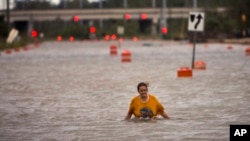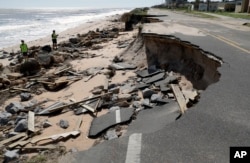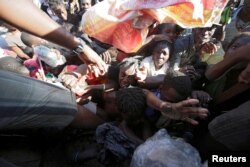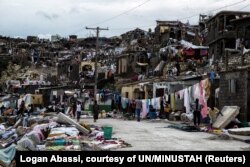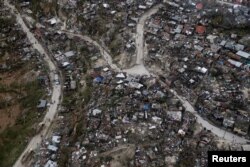The storm formerly known as Hurricane Matthew has lost its hurricane status, weakening to a post-tropical cyclone as it neared the end of a week-long charge through Caribbean islands and along the U.S. Atlantic coast that killed nearly 1,000 people, most of them in Haiti.
The storm also flattened communities and wrecked agriculture in the Dominican Republic, Jamaica, Cuba and the Bahamas.
Haiti has declared three days of national mourning, President Jocelerme Privet's office said, "in solidarity" with the parents and friends of the victims of Matthew and residents of the region who are suffering from the hurricane's impact.
Watch: Hurricane Matthew viewed from International Space Station
Matthew is moving northeastward over North Carolina's Outer Banks with maximum sustained winds of 120 kilometers per hour - half as strong as they were a week ago, but substantial enough for U.S. meteorologists to continue warning of the storm's danger.
Serious flooding and power outages affecting hundreds of thousands of people continued along the U.S. east coast from Florida north to Virginia; at least 15 people were killed in the storm, according to media reports early Sunday.
"Our state is facing major destruction and, sadly, loss of life,'' said North Carolina Governor Pat McCrory.
Matthew was the most powerful storm to hit the U.S. coast in nearly a decade, and one of the longest-lasting major hurricanes on record. One preliminary analysis puts damage estimates in the U.S. in the billions of dollars.
Casualties still rising
The hurricane was at its most powerful when it ravaged the Caribbean nearly a week ago with winds of 235 kilometers per hour. Although more than 900 deaths have been reported in Haiti, many areas of that impoverished country have not yet been thoroughly surveyed.
Haiti says 1.5 million people have been affected by the hurricane and 350,000 are in need of immediate assistance as most are homeless.
The U.S. military has been deploying aid to Haiti by air and sea, food and medicine as well as equipment, including heavy-lift helicopters, bulldozers, water-delivery vehicles and mobile operating rooms.
UNICEF says the conditions in Haiti are "perfect breeding grounds for waterborne diseases." Marc Vincent, UNICEF's representative in Haiti says, "Every day that goes by increases the threat of cholera."
As Matthew passed over Haiti it also raked the eastern tip of Cuba. Few reports of casualties or damage have emerged since Tuesday, but the island nation is expected to need massive quantities of relief supplies.
The Dominican Republic, which lies on the eastern half of Hispaniola Island, bordering Haiti, also felt Hurricane Matthew's power. The storm later coursed through the Bahamas before traveling north along the U.S. east coast, slowly weakening, but remaining just offshore until it made landfall in South Carolina Saturday.
Haiti hit hardest
The catastrophic damage this week in Haiti was made worse because the impoverished country is still recovering from a devastating earthquake in 2010. Thousands of people who have been living in flimsy shelters since the earthquake saw those washed away by the hurricane, which also destroyed a bridge that is the only link between a large portion of southern Haiti and the rest of the country.
Officials have warned the list of casualties will likely climb, perhaps significantly, as rescuers manage to reach remote villages.
Video images from Haiti showed entire landscapes of metal shanties that lost their roofs in the winds and driving rains, along with downed trees and fields of mud from overflowing rivers.
CARE Haiti director Jean-Michel Vigreux said one Haitian town with a population of 30,000, Jeremie, “is completely destroyed.”
The International Red Cross has issued an emergency appeal for $6.9 billion in relief aid for Haiti, the poorest country in the Western Hemisphere.





